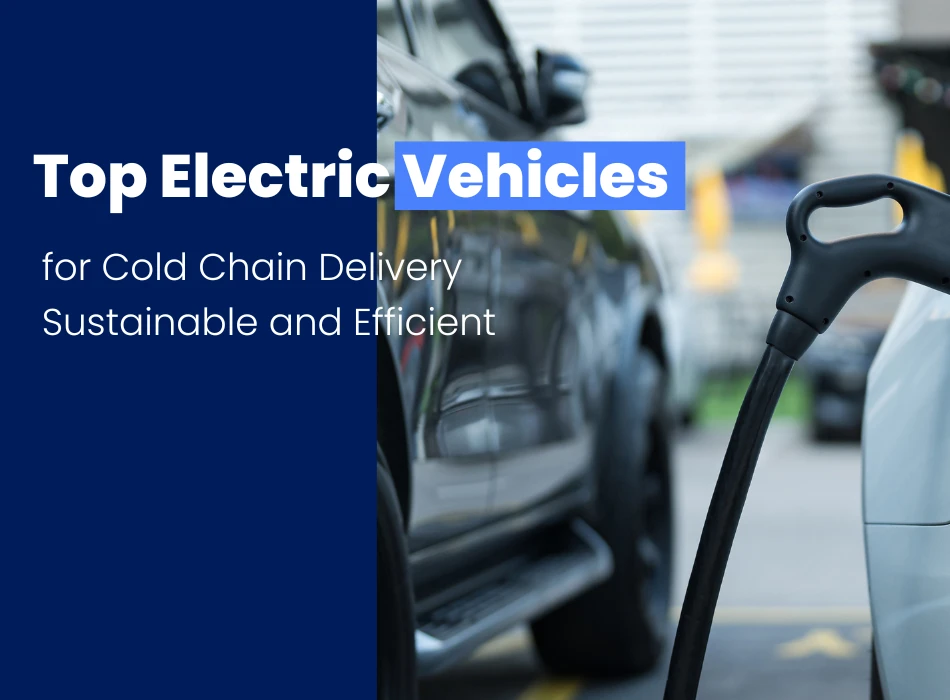Top Electric Vehicles for Cold Chain Delivery: Sustainable and Efficient
Explore the top electric vehicles designed for cold chain delivery, highlighting their sustainable features and efficiency in transporting temperature-sensitive products.

The demand for sustainable logistics solutions is driving the adoption of electric vehicles (EVs) in cold chain delivery. As the global push for reducing carbon emissions intensifies, the integration of EVs in cold chain logistics is becoming essential for maintaining product integrity while minimizing environmental impact. With the cold chain market projected to reach approximately $73 billion, the need for efficient, temperature-controlled transport solutions is more critical than ever.
This blog will highlight some of the top electric vehicles designed specifically for cold chain delivery, showcasing their features, benefits, and contributions to sustainable logistics.
Key Benefits of Electric Vehicles in Cold Chain Logistics
Reduced Emissions
- Electric vehicles produce zero tailpipe emissions, significantly lowering the carbon footprint associated with transportation. This aligns with global sustainability goals and regulatory requirements aimed at reducing greenhouse gas emissions.
Cost Efficiency
- EVs typically have lower operational costs compared to traditional diesel vehicles. They require less maintenance and benefit from lower fuel costs, making them a more economical choice for cold chain operations.
Improved Temperature Control
- Many electric vehicles are equipped with advanced refrigeration systems that ensure precise temperature control during transit, crucial for preserving the quality of perishable goods.
Top Electric Vehicles for Cold Chain Delivery
- Vaara Refrigerated Electric Vehicles
Vaara offers India’s first refrigerated container specifically designed for electric vehicles. Their innovative solution features a lightweight design and integrates seamlessly with EVs, ensuring optimal temperature control while minimizing operational costs. Vaara’s refrigeration units can reach temperatures as low as -20°C, making them ideal for transporting pharmaceuticals, groceries, and dairy products Vaara. - MachPhy Tri-Temperature EV
The MachPhy Tri-Temperature EV is designed to handle multiple temperature zones within a single vehicle. This flexibility allows grocery retailers to deliver a variety of products while maintaining optimal conditions for each type. The vehicle also features advanced battery technology that supports extended delivery ranges without compromising on performance MachPhy. - Carnotfleet CF Series
Carnotfleet’s CF series utilizes an Adaptive Thermal Control System (ATCS) that autonomously manages temperature control using machine learning and real-time data. These units are designed to meet various cold chain requirements, from biopharmaceuticals to general perishables, ensuring precise temperature maintenance throughout the delivery process StartUs Insights. - Ford E-Transit
The Ford E-Transit is an all-electric van that can be equipped with refrigeration units for cold chain applications. Its spacious cargo area allows for flexible configurations to suit various delivery needs, while its advanced connectivity features enable real-time monitoring of temperature conditions during transit Ford. - Mercedes-Benz eSprinter
The eSprinter is another excellent option for cold chain logistics, featuring a high-capacity battery that supports longer routes and efficient energy consumption. Its customizable cargo area can accommodate refrigeration systems tailored to specific temperature requirements Mercedes-Benz.
Challenges and Considerations
While electric vehicles present numerous advantages for cold chain delivery, there are challenges that businesses must address:
- Infrastructure Development: The availability of charging stations remains a barrier to widespread EV adoption in logistics.
- Initial Investment Costs: Although operational costs are lower, the upfront investment in electric vehicles and refrigeration technology can be significant.
- Range Limitations: Depending on the vehicle type and load, range anxiety can be a concern; however, advancements in battery technology are continually improving this aspect.
Conclusion
Electric vehicles are paving the way for a more sustainable future in cold chain logistics by offering efficient and environmentally friendly solutions for transporting temperature-sensitive products. As companies increasingly adopt these innovative vehicles, they contribute not only to reducing their carbon footprint but also to enhancing operational efficiency and product integrity. The future of cold chain delivery looks promising as more businesses embrace electric vehicles and invest in the necessary infrastructure to support this transition.